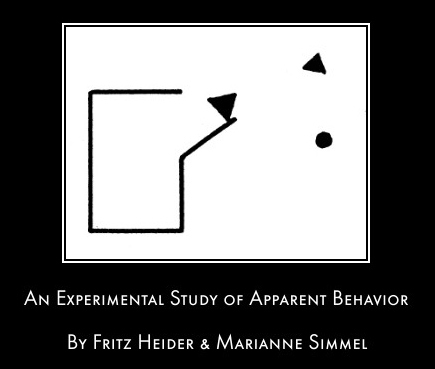
An Experimental Study of Apparent Behavior by Fritz Heider & Marianne Simmel was a landmark study in the field of interpersonal perception, in particular in relation to the attribution process when making judgments of others.
You can read and download this classic article for free via the link below, but before doing so have a look at the following video which was central to the authors methodological design. What do you think is going on in the video? Try telling the story of the video in a few sentences and try to answer the following questions.
1. What kind of a person is the big triangle?
2. What kind of a person is the little triangle?
3. What kind of a person is the circle (disc)?
4. Why did the two triangles fight?
5. Why did the circle go into the house?
6. In one part of the movie the big triangle and the circle were in the house together. What did the big triangle do then? Why?
7. What did the circle do when it was in the house with the big triangle? Why?
8. In one part of the movie the big triangle was shut up in the house and tried to get out. What did the little triangle and the circle do then?
9. Why did the big triangle break the house?
By doing this it will allow you to fully appreciate the thinking behind the experiment as well as allowing you to compare your responses with the original sample of subjects from 1944!
What Do You Make of This?
You can read and download An Experimental Study of Apparent Behavior by Fritz Heider & Marianne Simmel for free via the following link.
http://www.all-about-psychology.com/fritz-heider.html
The Psychology Student Survival Guide.

A Must Have Resource. 100% Free. See following link to get your copy today.
http://www.all-about-psychology.com/psychology_student.html
Please share this Psychology Blog Post with others by adding it to your social bookmarks.




www.all-about-psychology.com
A Free & Comprehensive Guide to The World of Psychology
Fritz Heider: An Experimental Study of Apparent Behavior










